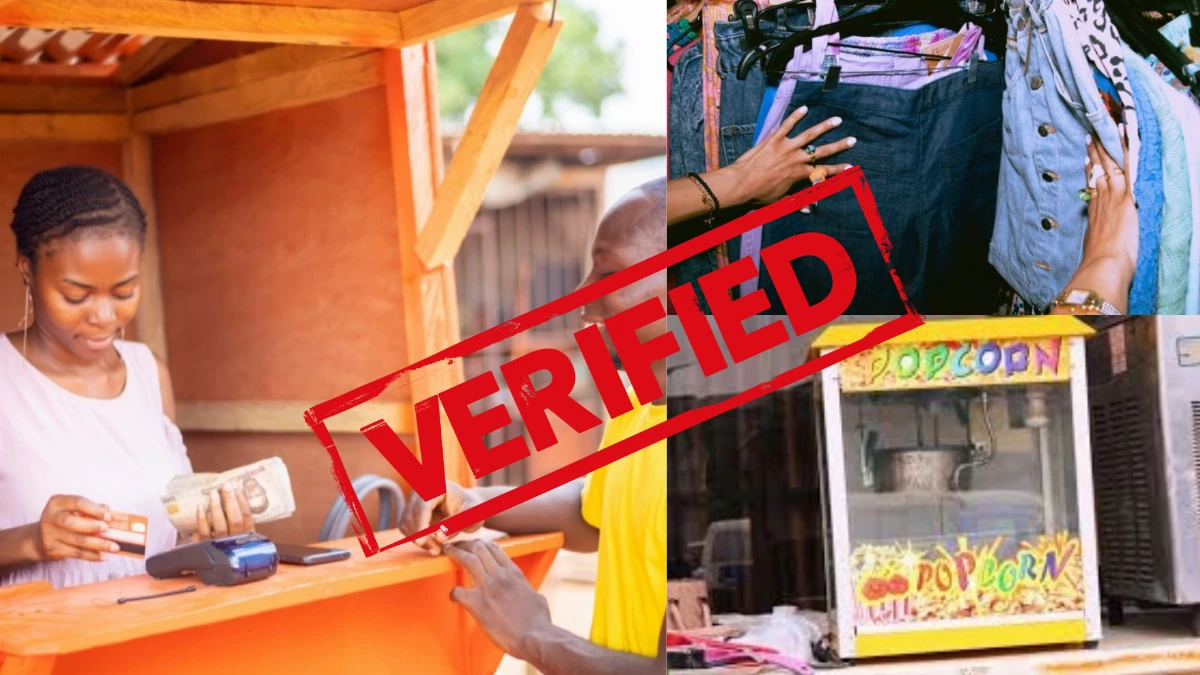What can you invest in Nigeria with 100k? Learn about options like mutual funds, stocks, small businesses, and digital assets to grow your capital.

With 100,000 naira in hand, you might be wondering how to turn this amount into something more significant, especially in today’s unpredictable economy.
While it may seem like a modest sum, there are a surprising number of ways you can invest or start a business with 100k in Nigeria.
In this post, we’ll explore a range of investment options to help you make the most of your 100k and start your journey toward financial independence.
Summary
- Investments like mutual funds, fixed deposits, and treasury bills offer stable, secure returns, ideal for conservative investors.
- Stocks, corporate bonds, and CDs provide higher returns with manageable risk, suitable for those open to some volatility.
- Cryptocurrencies and small-scale real estate ventures can yield significant profits but are risky and require strategic planning.
- With 100k, businesses like POS services, food stalls, and fashion accessories offer accessible entry points and daily income potential.
- Assess your risk tolerance, financial goals, income needs, and diversification to make well-informed investment choices.
Low-Risk Investments
Investing in low-risk options is ideal if you want to gradually grow your money without taking on significant financial risk.
Here are some solid low-risk investment choices that can help secure steady returns with 100k in Nigeria.
1. Mutual Funds
Mutual funds pool money from multiple investors to invest in a diversified portfolio, including stocks, bonds, and other securities. This beginner-friendly investment allows you to start with a small amount, and it’s managed by professionals who handle the complex aspects of investing.
Returns vary based on the type of mutual fund you choose, but generally, they provide stable growth over time. Many Nigerian banks and financial institutions offer mutual funds, making it easy to get started.
Below are some popular mutual fund options in Nigeria:
- Stanbic IBTC Money Market Fund: Managed by Stanbic IBTC Asset Management, this fund focuses on short-term securities, aiming for capital preservation and competitive returns.
- ARM Discovery Balanced Fund: Run by ARM Investment Managers, this balanced fund aims for capital appreciation and income generation through a mix of equity and fixed income investments.
- FBN Fixed Income Fund: Offered by FBNQuest Asset Management, this fund primarily invests in bonds and fixed-income securities to deliver stable returns.
- Vetiva Griffin 30 ETF: Managed by Vetiva Fund Managers, this equity-focused fund tracks the NSE 30 Index, targeting Nigeria’s top 30 stocks.
- United Capital Eurobond Fund: Managed by United Capital Plc, this fund offers a low-risk way to invest in Eurobonds, providing stable returns.
- Lotus Halal Equity Fund: This Shariah-compliant fund by Lotus Capital focuses on ethical investments, particularly in the equity market, catering to investors looking for Islamic finance options.
- Afrinvest Equity Fund: Managed by Afrinvest Asset Management, this fund targets long-term growth by investing in Nigerian equities.
2. Fixed Deposits
Fixed deposits (FDs) are a low-risk investment choice where you deposit a sum of money with a bank for a predetermined period, earning a higher interest rate than a standard savings account. The interest rate is usually fixed and predictable, providing stable returns, which makes FDs especially attractive for investors seeking a safe way to grow their capital without market exposure.
You can select the term length that best fits your financial goals, from short-term to long-term, with the assurance that your funds are secure. Here are some examples of current fixed deposit interest rates in Nigeria:
- Guaranty Trust Bank (GTB): Offers interest rates ranging from 4% to 12% per annum, depending on the amount and duration.
- First Bank of Nigeria: Typically offers rates between 7% and 10% per annum, varying by deposit term.
- Zenith Bank: Provides interest rates from 6% to 11% per annum, depending on the tenure and deposit size.
- Access Bank: Offers rates ranging from 5% to 10% per annum, based on the chosen term and initial amount.
- United Bank for Africa (UBA): Rates range from 6% to 12% per annum, influenced by tenure and deposit amount.
3. Treasury Bills and FGN Savings Bonds
Treasury bills and Federal Government of Nigeria (FGN) savings bonds are government-backed investment options that provide a secure way to earn returns.
Treasury bills are short-term investments with maturities ranging from 91 to 364 days, while FGN savings bonds offer a longer-term investment with fixed interest payments over time. Both options are considered some of the safest investments in Nigeria, offering stability due to their government backing.
These investments are accessible through banks and registered stockbrokers, making them a convenient choice for risk-averse investors.
Treasury Bills:
- Commercial Banks: Major Nigerian banks such as GTBank, First Bank, and Zenith Bank offer treasury bills. You can apply at a branch or online.
- Central Bank of Nigeria (CBN): Investors can participate in the CBN’s primary market auctions through their banks.
- Stockbrokers: Registered stockbrokers can assist in buying treasury bills in the secondary market.
FGN Savings Bonds:
- Stockbrokers: FGN savings bonds are available through stockbrokers registered with the Nigerian Stock Exchange (NSE).
- Banks: Some banks also facilitate FGN savings bond purchases.
- Online Platforms: Platforms like FMDQ OTC Securities Exchange offer access to FGN savings bonds.
Medium-Risk Investments

Medium-risk investments balance security and higher returns, making them suitable for those willing to take on a bit more risk for potentially larger gains.
Here are a few medium-risk options you can explore with 100k in Nigeria.
1. Individual Stocks
Investing in individual stocks means buying shares in publicly listed companies, which makes you a partial owner of the business.
Stocks can provide substantial returns, particularly when investing in sectors with growth potential, such as technology, agriculture, or consumer goods.
However, stocks are more volatile, so thorough research and diversification across different companies or sectors are crucial to managing risk. Online trading platforms in Nigeria allow you to start with small amounts, making it easier to enter the stock market.
Examples of individual stocks to consider:
- MTN Nigeria: With high growth potential driven by data demand, MTN Nigeria is a prominent option in telecommunications.
- Dangote Cement: A leader in Nigeria's construction sector, Dangote Cement benefits from ongoing infrastructure development.
- Nestlé Nigeria: This consumer goods company has a stable track record and a strong market position, appealing to conservative stock investors.
2. Corporate Bonds
Corporate bonds are issued by companies to raise capital, generally offering higher returns than government bonds. While corporate bonds offer attractive returns, evaluating the issuing company's financial health is essential, as bonds from less stable companies carry more risk. This investment type balances risk and return, making it an appealing medium-risk choice.
Examples of corporate bonds in Nigeria:
- Fidelity Bank Bonds: Fidelity Bank’s strong financial position makes its bonds an attractive option.
- Dangote Industries Bonds: Backed by one of Nigeria’s largest conglomerates, these bonds offer a solid risk-return balance.
- Lafarge Africa Bonds: A major player in building materials, Lafarge Africa’s bonds provide stability with medium-level risk.
3. Certificates of Deposit (CDs)
Certificates of Deposit (CDs) are fixed-term deposits provided by banks with interest rates typically higher than regular savings accounts. CDs are considered medium-risk, as they are low in security risk but require a commitment period where funds are less liquid.
The fixed term means that funds are locked in until maturity, rewarding investors with a higher return for this commitment. In Nigeria, several banks offer CDs with competitive interest rates, providing a stable choice for medium-risk investors.
Examples of CDs available in Nigeria:
- Access Bank Fixed Deposit: Access Bank provides attractive CD rates, ideal for secure returns.
- Zenith Bank Fixed Deposit: Zenith Bank is known for financial stability and offers flexible terms with competitive rates.
- First Bank of Nigeria Fixed Deposit: First Bank’s fixed deposits are designed for those seeking higher returns than standard savings accounts.
High-Risk, High-Reward Investments

High-risk investments present exciting growth opportunities for those with a strong risk tolerance and a strategic approach. These investments can offer substantial returns but may also experience high volatility, requiring careful planning and understanding.
1. Crypto and Digital Assets
Cryptocurrencies and digital assets are high-risk, high-reward investments that have gained traction due to their potential for rapid gains.
However, crypto markets are highly volatile, so it’s essential to research each asset thoroughly and develop a strategy.
Platforms such as Binance, Luno, and Yellow Card allow investors to start with as little as 100k, making it accessible for small-scale investors. To secure your holdings, consider using a digital wallet and staying informed about market trends.
Examples of popular cryptocurrencies:
- Bitcoin (BTC): Known for its large market cap and growth potential, Bitcoin remains a key player in the crypto world.
- Ethereum (ETH): Beyond being a digital currency, Ethereum supports smart contracts and decentralized applications, making it popular among developers and investors.
- Binance Coin (BNB): The native coin of the Binance platform, BNB offers utility in trading fee discounts and other services on the exchange.
- Cardano (ADA): With its focus on scalability and security, Cardano is a promising altcoin in the crypto ecosystem.
- Solana (SOL): Recognized for high-speed transactions and low fees, Solana appeals to developers and investors looking for efficient blockchain solutions.
2. Venture in Small-Scale Real Estate
While real estate often requires significant capital, creative strategies make it possible to participate with as little as 100k. Options include short-term rentals (like Airbnb), real estate crowdfunding, and even subletting.
Real estate crowdfunding platforms, for instance, pool funds from multiple investors to purchase and manage properties, providing returns through rental income or property appreciation.
Although market fluctuations and potential vacancies present risks, careful selection and market understanding can make small-scale real estate ventures a rewarding investment.
Examples of small-scale real estate ventures:
- Airbnb Rentals: Listing a property for short-term rentals can be profitable, especially in popular tourist areas.
- Real Estate Crowdfunding Platforms: Platforms such as Risevest and Coreum let you invest in property projects with low capital, offering returns from rental income and appreciation.
- Subletting: Subletting a rented property in high-demand areas can yield a profit margin if done at a higher rate.
- Property Flipping: Purchasing, renovating, and reselling properties can be lucrative if you have a sharp eye for undervalued properties and manage renovations efficiently.
Small Business Ideas with 100k Capital

If you're entrepreneurial and prefer hands-on investments, starting a small business with 100k can be a rewarding way to grow your capital. These ideas offer manageable entry points, low overhead, and the potential for steady income.
POS (Point of Sale) Business
A POS business is a popular venture in Nigeria, providing convenient banking services such as cash withdrawals, deposits, and transfers to people in areas with limited ATM access.
With 100k, you can cover essential startup costs, including a POS terminal, business registration, and initial cash flow. Depending on location and demand, POS agents can earn daily income from transaction fees, often between ₦5,000 and ₦15,000.
To get started, approach a reputable financial institution or mobile money provider for a terminal and ensure a secure, visible location for customers.
Food and Snack Business
The food business is a high-demand sector where you can quickly gain loyal customers. With 100k, you can start a small food stall or catering service, focusing on profitable items like parfaits, small chops, snacks, or pastries.
Selecting items that are easy to prepare and store, such as donuts, small cakes, and fruit parfaits, helps manage costs while attracting a wide customer base. This business works well in high-traffic areas like markets, schools, and offices, where quick snacks and takeaway meals are in demand.
Fashion Accessories Business
Fashion accessories are always in demand, especially in urban areas where personal style is important. You can start with a stock of affordable, trendy items such as jewelry, hair accessories, and locally made products that appeal to diverse tastes.
Consider selling through social media platforms or setting up a small kiosk. Additionally, sourcing items from local markets or wholesalers keeps costs low, allowing you to offer competitive pricing while maintaining good profit margins.
Gift Curation and Events Services
Gift curation has become popular for special occasions, offering customers an easy way to find thoughtful gifts without the hassle of shopping. With 100k, you can start a small business creating themed gift boxes with items such as candles, skincare products, and chocolates.
You can also offer affordable event planning services on a small scale, such as birthday decor or intimate gatherings, where you collaborate with local suppliers. This type of business benefits from building partnerships with small brands and leveraging social media to reach more clients.
Key Factors to Consider Before Investing Your 100k
Before committing your funds to any investment, consider these key factors to make informed decisions and enhance your financial security.
1. Risk Tolerance: Determine your comfort level with risk. Low-risk options like treasury bills offer stability, while high-risk assets like cryptocurrency can provide higher returns but come with more volatility.
2. Financial Goals and Time Horizon: Identify whether you’re investing for short-term gains or long-term goals. Short-term investments, like freelancing or high-yield savings, are ideal for quick returns.
For long-term goals, such as buying property or saving for retirement, steady investments like stocks or mutual funds are better suited. Aligning your choices with your goals ensures a more effective strategy.
3. Income and Cash Flow Needs: When selecting investments, consider your current income. Fixed deposits or corporate bonds provide stable returns, complementing a regular income. If you need extra income or more cash flow flexibility, options like freelancing or a small business may be a better fit.
4. Diversification Spreading your funds across different assets, like mutual funds, small businesses, or digital assets, helps protect against market shifts. Diversification reduces risk and improves the likelihood of stable returns, making it easier to withstand fluctuations in any single market.
Conclusion
There are plenty of opportunities to grow your capital from low-risk options like mutual funds and fixed deposits to more dynamic avenues such as stocks, small businesses, and digital assets.
The key to success lies in understanding your risk tolerance, financial goals, and cash flow needs while ensuring your investments are diversified to minimise risk.
Start small, stay consistent, and keep educating yourself—your financial future is in your hands!

